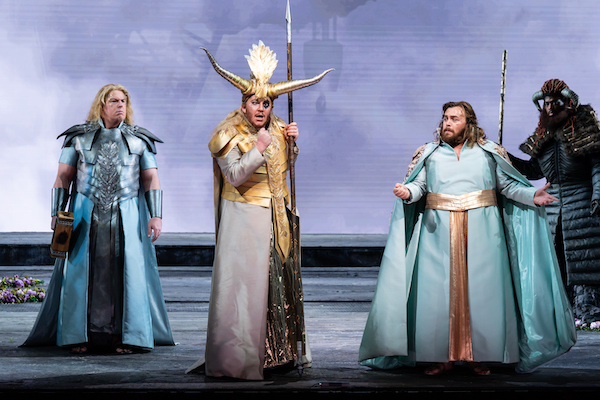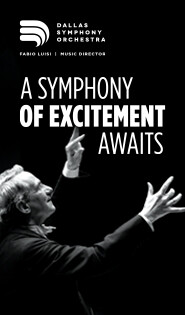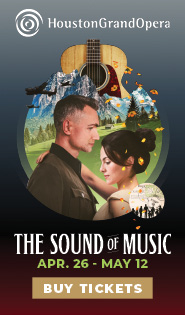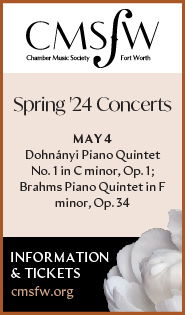Dallas Opera serves up an electrifying “Rheingold”

At the time Richard Wagner’s Ring cycle was conceived, he was swept up in the revolutions of 1848 and was writing anti-clerical and proto-socialist articles. While in exile, following the quelled revolution, he wrote: “As the art of the Greeks encapsulated the spirit of a great nation, so too should the art of the future express the spirit of a liberated humanity which goes beyond the limits of nationality.”
The original conception placed the hero Siegfried as the central role through the cycle. He was to destroy a society corrupted by gold and power, proclaiming a new social order that would be based on love. However, Wagner came to view this idea as hopelessly utopian, replacing Siegfried with the god Wotan, who represents the old order of the world, striving in obduracy toward its own destruction. Lovelessness, the lust for power, and the central character’s powerlessness to prevent the ruin of the world transformed an optimistic heroic drama into a complex elegy of pessimism.
The Dallas Opera debuted a new production of Das Rheingold, the first of four works comprising Wagner’s colossal epic, Friday night performance at the Winspear Opera House. With sets from Atlanta Opera and some help from Dallas Stage Scenery, the staging blends the flamboyant dreamscapes of fantasy and lore with the industrial coldness of familiar, modern-day imagery. Director Tomer Zvulun presents the ancient myth in a way that celebrates the composer’s artistic intentions, posing the universality and timelessness of legend as a vehicle for analyzing critically the dire truths of the present time.
Friday night’s performance delivered some of the most electrifying singing and music-making from the Dallas Opera in many years. With the pit opened to its fullest “Wagner” position, music director Emmanuel Villaume led the 96-piece orchestra in superb form. Together, they navigated the dense landscape of Wagner’s score with lush sonorities and motivic clarity. The musical vision of the opera’s three main settings—the gleaming Rhine, the heavenly halls of Valhalla, and the craggy mechanizations of Nibelheim—were shrewdly interpreted and translated with notable immediacy.
Nicholas Brownlee was the vocal standout of the evening as Wotan. Showing absolute command and artistry, the bass-baritone sang with a resonant power that would effortlessly swell to fill every crevice of the hall then contract to a hushed and focused piano. His color was consistently rich and his phrasing elastic, with a depth that made the ruler of the gods seem affectionately vulnerable, and thus, chillingly relatable. His rendering of Wotan’s final aria “In the evening does the sun’s eye beam” was notably compelling and sublime.
Portraying his foil—the power-hungry, lecherous dwarf and dictatorial lord of the Nibelungs, Alberich—baritone Michael Mayes was equally expressive if lighter in heft. At times, Mayes’ baritone was covered under a fitfully dense accompaniment from the pit. Still, his thorough commitment to character yielded a portrayal that was difficult to take one’s eyes off of. His dramatic skills were manifest in the drawf’s many sides—bombastic, belligerent, and comical.
Loge, the scorned demi-god of fire and Wotan’s manipulative advisor, was portrayed ably by tenor Brenton Ryan. His interpretation of this villain had a populist slant, echoing that of Marvel’s Loki, as portrayed by Tom Hiddleston. His slippery, silver-tipped tone was matched by the mischievous and playful nature of his phrasing, commanding a glint that notably clashed—perhaps intentionally, with the warmth and body of the rest of the heavenly hosts. Ryan did well to set himself apart, visually and aurally, from his compatriots, alerting the audience immediately to the character’s connivance and cunning.
Mezzo-soprano Amanda Echalaz, in the role of Wotan’s wife Fricka, wielded a power and amplitude that stood up ably to that of her mate’s. She was tender and warm, with a spin that carried her easily into the upper registers on grand fortes. Soprano Karen Slack gave Freia, the goddess of love and damsel in distress apt emotional drama in her panic and dismay.
Basses Solomon Howard and Peixin Chen gave stout portrayals of the giants Fafner and Fasolt, respectively. Their presence on stage, though, was a bit stiff, likely due to the bulkiness of their costumes and giant-esque mannerisms. Mime, Alberich’s cowardly set-upon brother, brought a bit of levity through tenor Barry Banks’ portrayal. He was charmingly buoyant and light, denoting the role’s ever-constant timidity and fearfulness.
enor Robert Stahley as Frohe, and baritone Joseph Barron as the god of thunder Donner, lent sturdy support. Contralto Lindsay Ammann’s cameo as Erda, the foretelling primal earth mother, was affectionate and warm. Singing upstage through a vail of stingy curtain, she nimbly carried with her the requisite weight that suggested the fullness of Gaia.
Soprano Diana Newman, mezzo-soprano Lindsay Kate Brown, and soprano Hannah Ludwig made an excellent trio as the Rhinemaidens Woglinde, Wellgunde, and Flosshilde, respectively. As the first voices heard, they properly set the stage for thrilling acts of vocal mastery, and their blend yielded an effect that was haunting and foreboding.
Mattie Ullrich’s costumes worked beautifully against Erhard Rom’s set design. The effect was a bit matter-of-fact, augmented by projections that leaned more towards modernity. Save for some technical issues, it coalesced into a setting that was, indeed, timeless, while still maintaining a sense of immediacy. The fight choreography could have been executed with a bit more gusto.
Das Rheingold will be repeated 2 p.m. Sunday, and 7:30 p.m. Wednesday and Saturday. dallasopera.org


